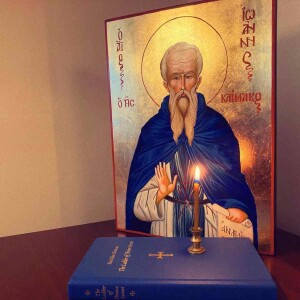What does it mean to live in Christ and for Him? Perhaps this is a question that we rarely ask ourselves because it’s too threatening. What would our lives look like if our response to God was absolute? What would our mourning for sin look like if our love for God was filled with desire for Him and for His will?
One would imagine that life, our lives would look much different. It is not just one part of ourselves that is to be touched by the grace of God, but every aspect of our being, our very essence. Saint John and the other Desert fathers speak of mourning for one’s sin in such a visceral fashion because they unde...
What does it mean to live in Christ and for Him? Perhaps this is a question that we rarely ask ourselves because it’s too threatening. What would our lives look like if our response to God was absolute? What would our mourning for sin look like if our love for God was filled with desire for Him and for His will?
One would imagine that life, our lives would look much different. It is not just one part of ourselves that is to be touched by the grace of God, but every aspect of our being, our very essence. Saint John and the other Desert fathers speak of mourning for one’s sin in such a visceral fashion because they understood that they were called to participate in a Godly love. God took our flesh upon Himself in order that we might come to experience the fullness of His life and love. To experience themselves as turning away from this gift or betraying this love could only bring about the deepest mourning and their hearts. The question that we perhaps should be asking ourselves is: “why do we lack this quality of mourning?”
---
Text of chat during the group:
00:24:51 Charbel & Justin: What page?
00:25:00 Bridget McGinley: 118
00:36:55 Anthony: This is interesting since I can't be the only one who wants to understand _before_ practicing; who wants to know before and judge whether something is worth perseverance.
01:05:59 Anthony: From my college Greek class, there is another connotation: "eleison" comes from the root "luo", "to loosen."
01:22:24 Ambrose Little, OP: It didn’t quite strike me this way before these meditations we are studying, but St. Paul seems to have been expressing this kind of mourning when he wrote about his inability to do the good he wants to do (in his inner self that loves the law of God) but instead does the evil at hand (in his flesh which is at war with himself): “Miserable one that I am! Who will deliver me from this mortal body?” But also immediately he proceeds to gratitude for victory through grace: “Thanks be to God through Jesus Christ our Lord.” The same also leads him to “glory in [his] weakness.”
01:25:47 Ambrose Little, OP: (The above was from NABre 🤷🏻♂️ 🙂 )
01:26:05 Rebecca Thérèse: Thank you 🙂
01:26:57 Jeff O.: Thank you!
01:27:08 kevin: Thank you
01:27:19 Cindy Moran: thank you
View more













